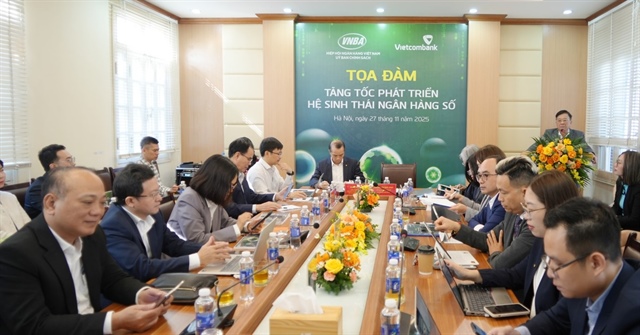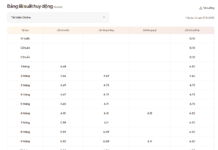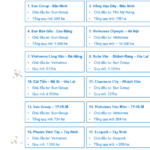On November 27, the Policy Committee of the Vietnam Banks Association, in collaboration with Vietcombank, hosted a seminar titled “Accelerating the Development of the Digital Banking Ecosystem.”
The seminar aimed to explore emerging trends, share insights, and propose solutions for building a modern, secure, and sustainable digital banking ecosystem. It also sought to strengthen connections between regulatory bodies and credit institutions.
 Banks accelerate the development of the digital banking ecosystem. Photo: Hoàng Huy |
Accelerating Digital Banking
During the seminar, banks highlighted their robust efforts to develop digital ecosystems, each with distinct strategies.
For instance, Vietcombank aims to establish a fully integrated digital ecosystem by 2030, seamlessly connecting with customers. The bank has implemented multi-channel integration and linked with national data systems.
BIDV focuses on creating an end-to-end retail credit ecosystem via BIDV Home, leveraging API connections with real estate, automotive, and supply chain partners to automate processes from sales to disbursement.
Techcombank is executing a “Cognitive Transformation” strategy, centered on a “Data Brain” that processes up to 8 billion data points daily to hyper-personalize customer experiences.
Techcombank’s ecosystem follows an “all-in-one” model, integrating WINLife (T-Pay one-tap payments), TCInvest investment platform, and insurance services.
Representatives from credit institutions also discussed challenges in implementing digital banking ecosystems and proposed solutions to expedite their development.
A BIDV representative noted that the bank faces data-related issues, particularly in product marketing and credit proposals. Insufficient data hinders accurate customer analysis for targeted sales.
The representative cited missing datasets, including real estate, movable assets, legal information, planning details, developer data, and customer information for credit assessment and approval.
Proposals from Banks
Credit institution representatives emphasized the need for a unified legal framework governing data sharing, digital identification, and more flexible pilot mechanisms from regulators.
Citing South Korea’s experience, a BIDV representative highlighted the government’s leadership in establishing shared platforms like Mydata and digital signature infrastructure. This prevents resource wastage and standardizes technical norms (APIs, data) for seamless connectivity. South Korea also formed dedicated organizations like the Mydata Support Center for operations, dispute resolution, and customer support.
BIDV urged the State Bank of Vietnam to lead by creating pilot mechanisms and issuing Open Banking standards to avoid fragmented connections.
The bank also proposed developing a shared Open Banking platform (similar to NAPAS) and designating the State Bank as the data-sharing hub via the National Data Center.
Additionally, BIDV called for revising electronic lending regulations to separate them from traditional processes.
Vietcombank recommended that the government finalize the legal framework for economy-wide “Open Data.” Notably, Vietcombank proposed allowing state-owned commercial banks to invest in and establish Fintech and technology companies to keep pace with innovation.
The bank also stressed expanding the Sandbox mechanism for emerging technologies like Blockchain and digital assets.
A Standard Chartered representative advocated shifting from “Compliance Control” to “Compliance Collaboration” to foster innovation. They also urged ecosystem cooperation to combat increasingly sophisticated fraud risks.
BÙI TRANG
– 19:16 27/11/2025
Dr. Nguyen Quoc Hung: Digital Banking Transformation Shifts Focus to “Quality” Over Mere “Speed”
In the face of increasingly stringent regulations surrounding personal data protection and electronic transactions, the evolution of digital banking ecosystems must transcend internal business operations. According to Dr. Nguyễn Quốc Hùng, this development should foster region-wide connectivity, enhancing customer convenience while simultaneously fortifying defenses against cross-border fraud and deception.
Dr. Trần Quý: In the Era of Aspiration, Policies Are Not Barriers but Value Filters
Speaking at the SIHUB seminar on the afternoon of November 26th, Dr. Tran Quy asserted that Vietnam is entering a new phase of governance, where policy becomes the pioneering force and filtering mechanisms are in place to attract valuable capital, technology, and talent, rather than lagging behind reality or creating barriers.
Why Vietnamese Investors Are Still Locked Out of Crypto Assets: State Securities Commission Explains
According to regulatory authorities, restricting cryptocurrency transactions solely to foreign investors is a cautious measure designed to safeguard domestic investors and mitigate risks during the initial phase.
Unlock Land and Housing Data with Just a Few Clicks
The Ministry of Agriculture and Rural Development, in collaboration with the Ministry of Construction, has finalized a joint plan to develop and integrate a national database for land and housing. This initiative aims to eliminate data redundancy and optimize resource allocation, ensuring a more efficient and streamlined system.




















